Afraid of the dangers of getting electrocuted by headphones? Here’s how you can avoid them.
For most of us, headphones have become a vital part of our day-to-day lives. But as useful as they are, one may not help to worry about their safety, especially when hearing news of people getting electrocuted by headphones.
Hearing this can make anyone think twice about some habits. And no one can blame you if you decide to ditch using headphones altogether in fear of experiencing the same fate as the past victims. But what if using headphones is necessary for work or online classes? How can you be safe?
Don’t worry! We got you covered. Here’s a detailed breakdown of how electric shocks by headphones happen, and the preventive measures you can take.

Can Headphones Electrocute You?
The short answer is: Yes.
However, the chances are incredibly slim. Technically, your headphones alone don’t handle enough voltage to cause electrocution. Having said that, it’s possible to get electrocuted under specific circumstances (e.g., power surge, faulty chargers, exposed wires, water elements).
But before we jump into how to avoid these circumstances, it’s better to have a good grasp of the difference between electrocution and electric shock. While these terms may seem similar, their meanings are worlds apart.
- Electrocution: An electric-related accident where one dies from it.
- Electric Shock: Involves any degree of electric-related injuries without causing deaths.
It can sound absurd, but people do get electrocuted from headphones. More recently, this included the death of a 13-year old boy from the Philippines.
This can be scary, but remember that electrocution by headphones is extremely unlikely under normal circumstances. However, mild electric shocks (from static build-up) aren’t uncommon.
What Are the Possible Causes of Electric Shock When Wearing Headphones?
As mentioned, getting electric shocks (not electrocution) is common for headphone users. And although various factors can cause these shocks, they usually result from these events:
Understanding how these happen can help you avoid these scenarios so you never have to experience electric shocks by headphones.
Static energy build-up
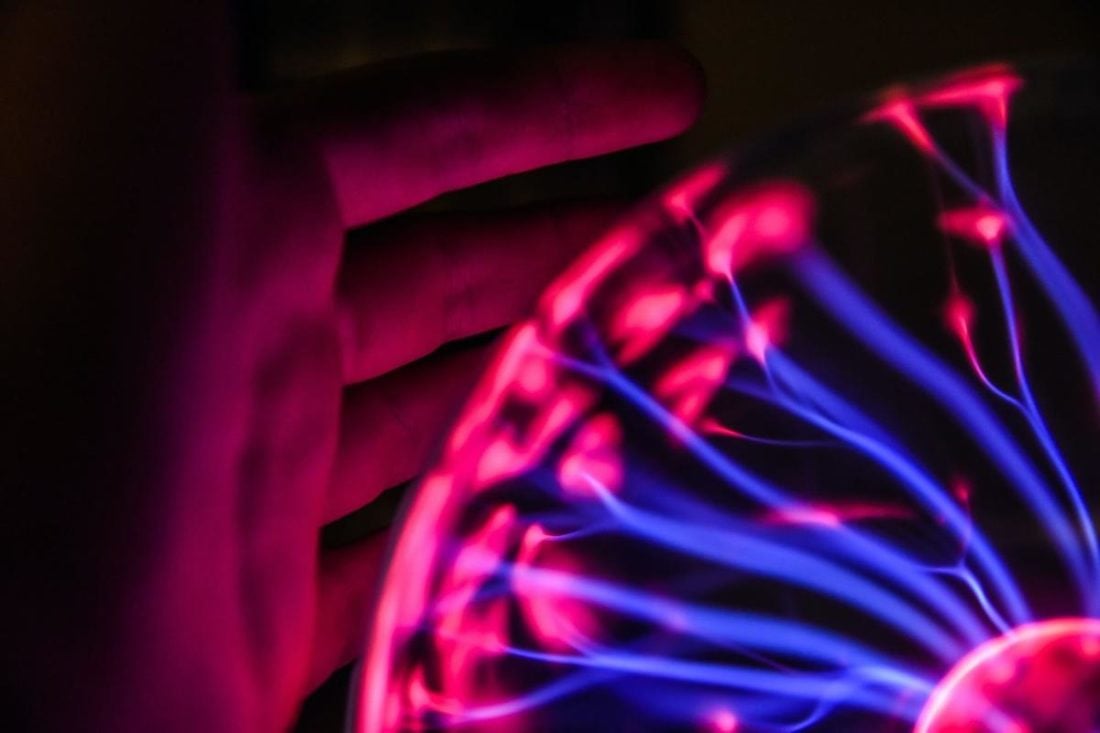
Static discharge is the result of the imbalanced charges within or on the surface of a material. It occurs when two surfaces rub against each other.
Static electricity is more common than you think. Have you walked across a carpet and experienced electric shocks the moment you touch something? That’s static electricity.
Other samples are making your hair stand while rubbing balloons against your head or moving your hand a few centimeters above the television screen.
However, not all surfaces rubbed together can form static energy. You can expect greater static discharge when one surface is made from insulating materials such as rubber, wood, and plastic. Unfortunately, these are some of the most common materials in headphones. So rubbing them with other insulators, like wool or your hair, can generate static electricity.
Other factors that promote static energy build-up are:
- Low humidity environment
- Synthetic or woolen material
- Any movement that allows the headphones wires to constantly rub against your body
To give you a better idea, here are some scenarios where it’s likely to occur.
Scenario 1: Running causes your headphones cord to rub against the surface of your clothes. This causes the static charge to build-up and eventually reach a threshold to mildly shock you.
Scenario 2: Lower humidity means less moisture in the air to absorb the charges. So, people living in a dry and windy climate are more susceptible to electrical shocks.
But, keep in mind that electric shocks from static discharge are usually harmless. And while they may cause a slight annoyance, they are highly unlikely to cause electrocution.
Damaged headphone wires
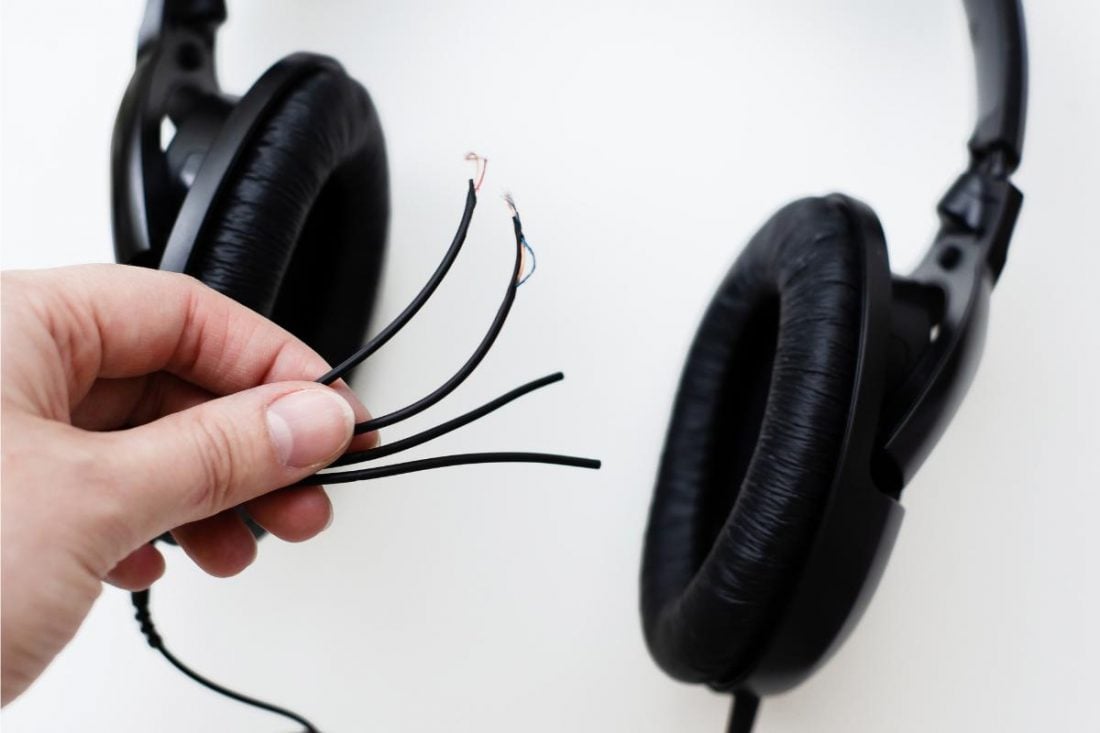
As mentioned earlier, your headphones do not carry enough voltage to shock anyone. Thus, exposed headphone wires themselves don’t pose a threat. But this changes if they are connected to an electrical source (e.g. direct AC charger, charging computer) or good conductors of electricity (e.g. metal).
If you have faulty wirings in your headphones, we encourage you to repair them immediately. All it takes is one large power fluctuation to seriously injure you.
Fortunately, you don’t have to break the bank to prevent electric shock. Feel free to check out our guide on some DIY tricks to fix a short in your headphones without harming yourself.
Faulty chargers
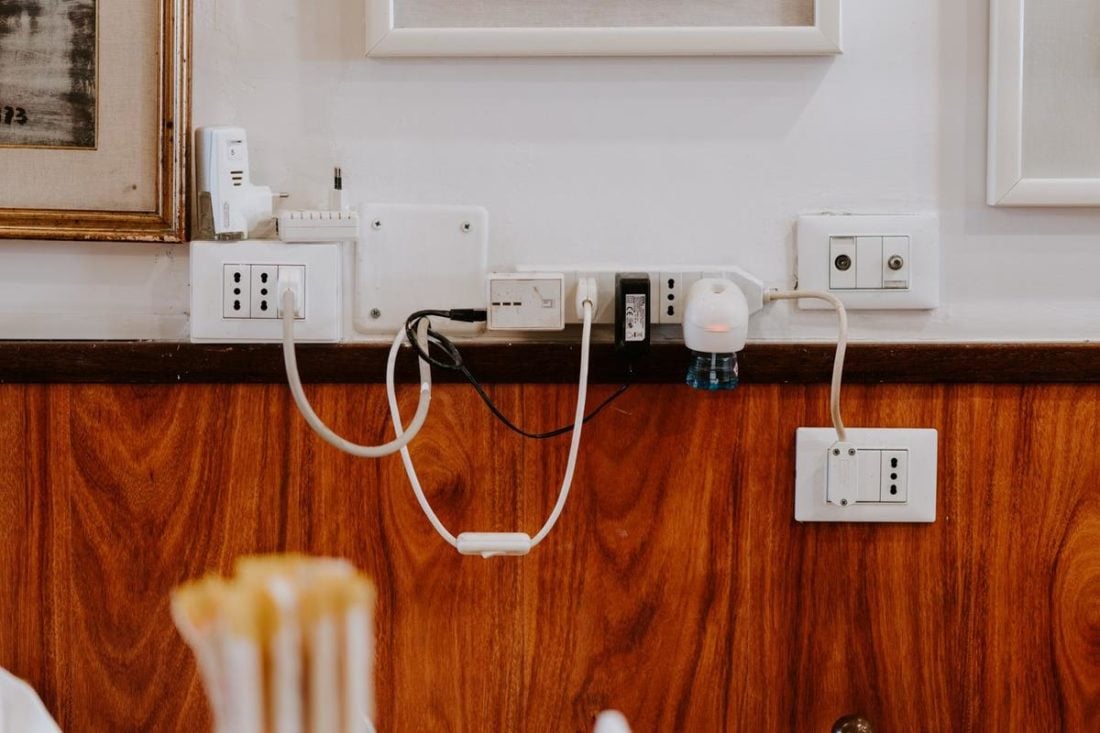
People have experienced burns and melting of headphones in their ears when used while charging their phones. This happens because of low-quality chargers.
Using a cheap, substandard charger not only damages your device, but it endangers your life as well.
The wall sockets in your house have an output of 240V while most phone charges give an output of 5V. Therefore, a reliable charger would regulate the electrical output accordingly.
On the other hand, a substandard charger won’t easily handle the output and breakdown. This causes the full 240V to go into your phones and headphones, potentially sending electricity directly to your head.
For your personal safety, you should only purchase chargers from an authorized distributor. And check if a certain device has any history of faulty chargers.
Are Specific Headphone Types More Prone to Electrocution?
Thankfully, most headphones in the market are safe because of the insulative materials (e.g. plastic, rubber, silicon, etc.) they’re made from. It’s not so much about the type of headphones; rather, it’s the way it’s used and how they are made.
You may think that wireless headphones are a smaller threat because they can work without wires. But it still depends on their battery quality.
Most wireless headphones (and mobile devices) use lithium-ion batteries because they are small and inexpensive to produce. However, there are several incidents of lithium-ion batteries exploding. An example of this is one incident of wireless headphones exploding while being used mid-flight.
This doesn’t mean that all lithium-ion batteries are dangerous, though. These batteries explode only because of manufacturing errors, where the thin plastic separating two flammable solvents, the lithium cobalt oxide and graphite, gets damaged. Thus, causing pressure leading to fire or explosion.
Will Wet Headphones Automatically Electrocute You?
Wet headphones don’t pose any health issues if they’re connected to a portable media source. A little bit of moisture is actually good to reduce static shock.
But this doesn’t mean that using wet headphones is recommended. When using wet headphones, you’re more likely to short the internal circuitry than getting electrocuted.
Moreover, situations with excessive moisture can be an accident waiting to happen. Hence, you should avoid using your headphones during and after bathing/swimming, and while sweating heavily during and after a jog.
Water is an excellent electrical conductor. You risk fatal electrocution when you use your headphones connected to the power socket right after your bath or while you are wet. And since our bodies are 60% water, we become a natural conductor to discharge all the electricity, electrocuting you in the process.
How Can You Avoid Electric Shock When Using Your Headphones?
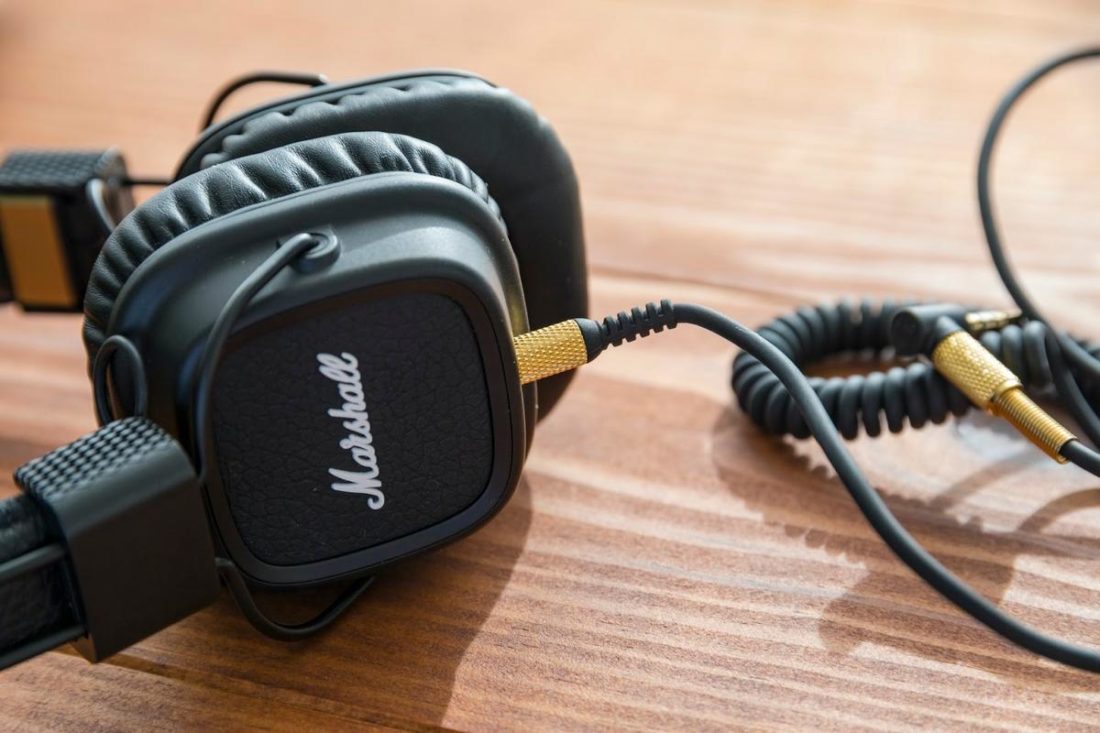
Despite the reported accidents, the likelihood of electrocution is negligible. It’s easy to ensure your safety when wearing headphones. But, if you want to be extra careful, here are a few tips on how to avoid electric shocks while using headphones:
Discharge static electricity
Carrying a metallic item helps to discharge the static electricity build-up. At the gym, you can touch the metal sensor for monitoring heart rate on the treadmill or hold metal weights to earth yourself.
Wearing an anti-static wristband while jogging also helps to remove these static charges. Other alternatives include drying your clothes with wool dryer balls or homemade aluminum dryer balls.
Try to reduce static energy build-up
There are various ways to reduce static energy build-up.
One, is wearing clothes made from natural fibers (e.g. cotton, wool) builds up the charges at a significantly slower rate.
Other than that, since static electricity builds up faster in dry or humid areas, using a humidifier can also be helpful in keeping the humidity levels at an optimal level. It’s particularly useful in overly dry environments (e.g. winter, air-conditioned rooms).
Moreover, using anti-Static sprays on your workout clothes, gym gear, and furniture can also help to minimize potential earbud shock.
Don’t use wired headphones while charging your phone
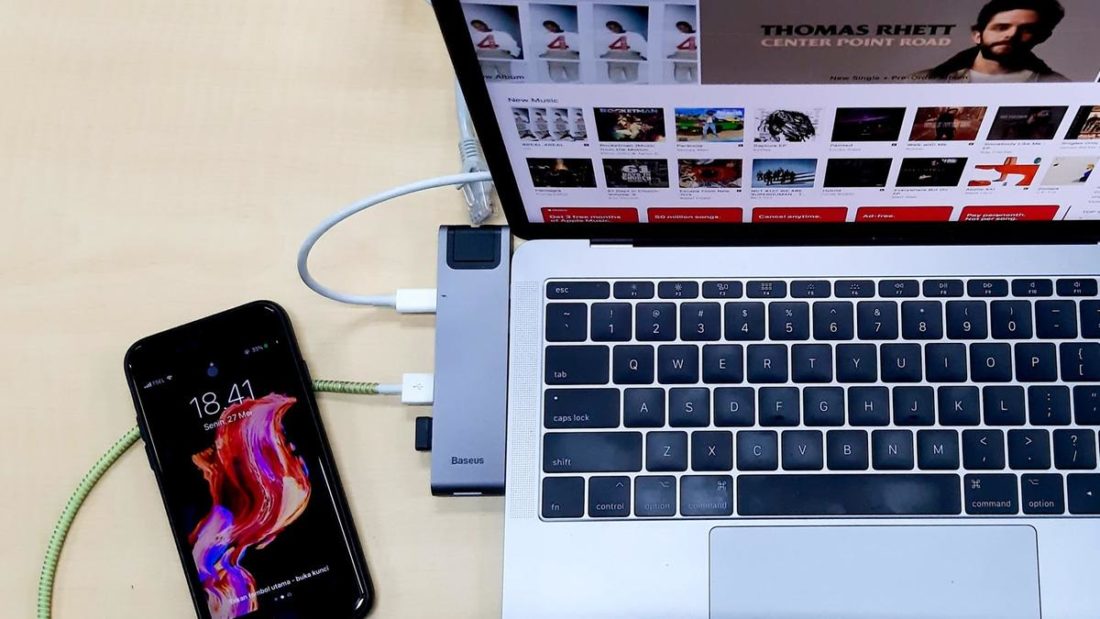
Chargers are designed to convert the high-voltage power input into the appropriate output for your device. For smartphone and laptop chargers, it converts the input of 110V-240V into a 5V and 20V output respectively.
When you use a low-quality charger purchased from an external vendor, it doesn’t convert into the appropriate voltage. Instead, it transmits the full 240V directly into your devices, exposing you to serious danger.
You should only purchase chargers from the official store or licensed vendors.
Cover and fix exposed headphone wires
As a result of worn-out wire insulation, exposed headphone wires are more prone to short circuits.
Luckily, you only need a few minutes and a few tools to fix your headphones’ frayed wires. One tool you can use is the Sugru Mouldable Glue. Thanks to its moldable, durable, waterproof, and insulative properties, this can easily be adjusted to be a durable cover for fixing exposed wires.
For a more permanent fix, we recommend using heat-shrink tubings. These tubings are frequently used for repairing, reinforcing, and insulating frayed electrical wires.
You can check out our separate guide for more solutions to fix headphone wires.
Avoid using headphones while you’re wet
Water is the perfect electrical conductor.
General rule of thumb: don’t come in contact with any charging electrical devices when you’re wet.
If you just came out of a shower or drenched by the rain, avoid handling any electrical device connected to the AC power socket.
Conclusion
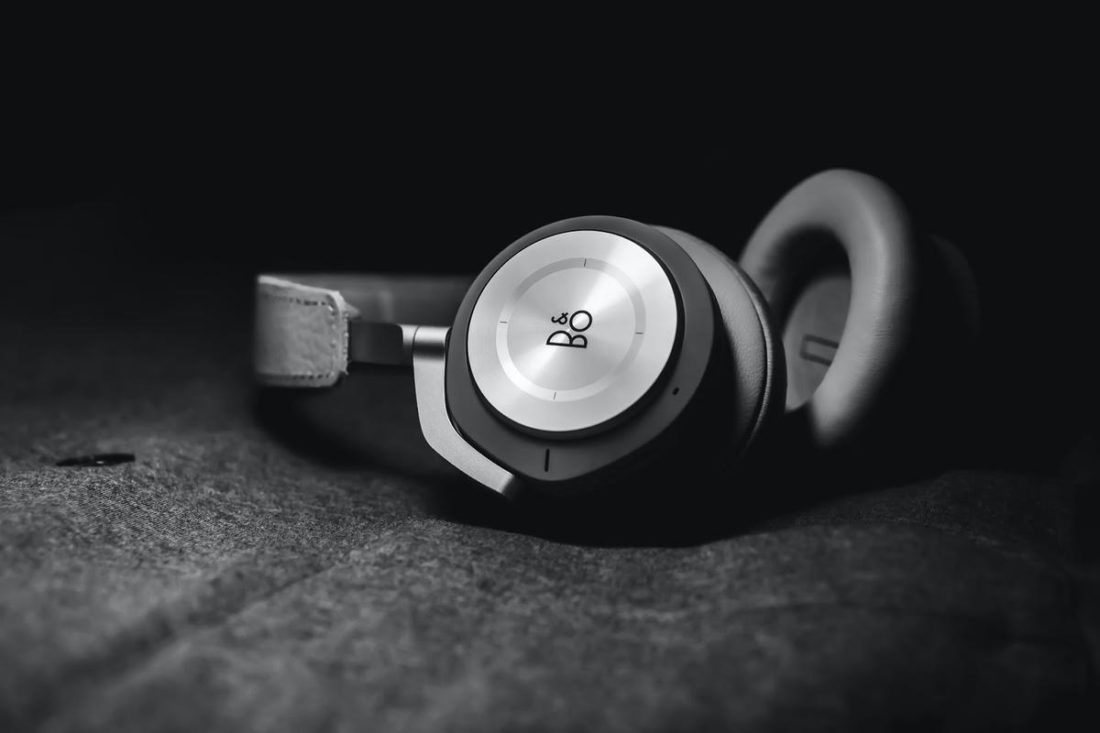
Although electrocution by headphones is a real threat, it rarely happens. Plus, the odds are significantly reduced when all the precautionary measures are in place.
With these tips, you can be sure to safely enjoy your favorite tunes with your headphones. All without any fear of getting electric shocks, or worse, electrocution.
Are our tips useful? Or, do you have other solutions you can recommend to avoid getting electrocuted by headphones? Share with us via the comments section below.

I have students who habitually chew on the cord of their wired ear buds and head phones. Is there a danger if they bite through the insulating plastic?